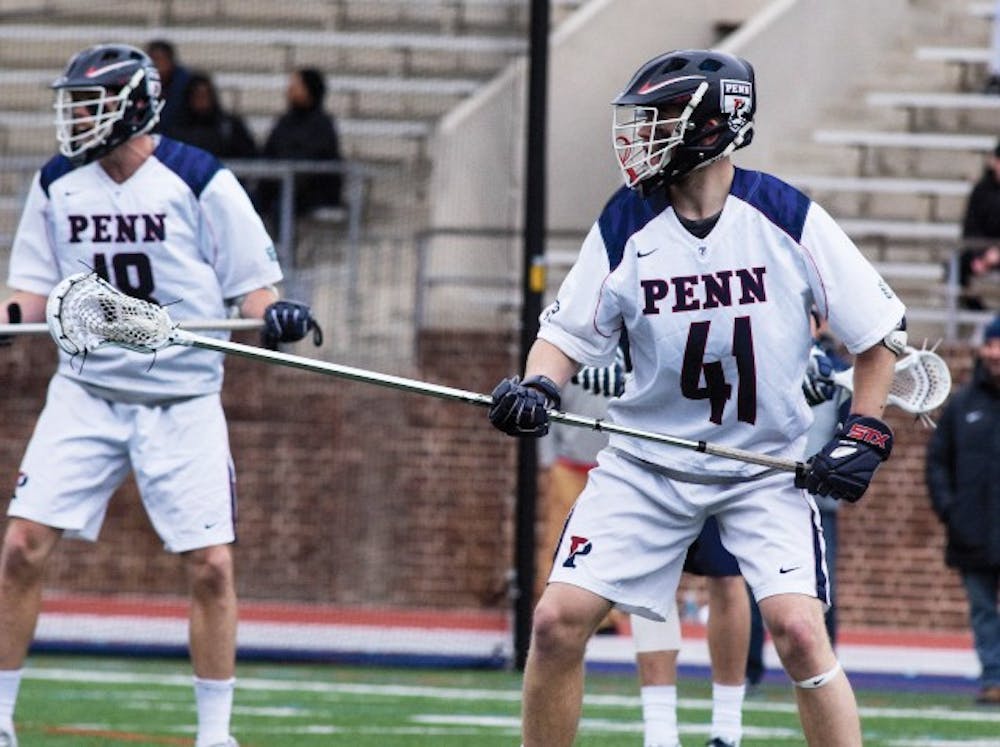Sometimes it’s what happens behind the scenes that makes all of the difference.
Saturday may be the first time that Penn men’s lacrosse officially faces off with Brown this season, but the Quakers (5-5, 1-2 Ivy) are already quite familiar with the tendencies and playbook of their conference rivals.
With whom does the credit for this preparedness lie? Look no further than the Red and Blue's offensive and defensive scout teams.
While the players that occupy these squads are not the names that often appear in the Saturday box scores, guys like senior midfielder Kyle Scheetz and sophomore defenseman Tom Stevens deserve a lot of credit for the success that their more recognizable teammates have on game days.
When Connor Keating causes a turnover by predicting an opposing midfielder’s split dodge, he can thank Scheetz and company. When Simon Mathias reads a slide and dishes to a teammate for a goal, credit can be traced back to Stevens and his fellow look-team defensemen. When Reed Junkin anticipates and stops a point-blank bounce shot from the other team’s attackman, he does so because of the work of his teammates, most of whom don’t step foot on the field come game time.
Each week, the scout teamers are faced with the unenviable task of studying and internalizing the sets and actions of the opposing team, in this case Brown (4-4, 1-1). Then, they have to recreate those sets on the practice field in order to give Penn’s first team offense and defense a taste of what’s to come on game day.
Every practice, Scheetz, Stevens, and the rest of the second unit serve as the bad guys, the enemy, the opposition. Their successes in practice are equivalent to the successes of Penn’s opponents, and so Scheetz’s goals aren’t met with cheers and Stevens’s takeaways aren’t met with rousing applause. Yet still, in the name of teamwork, they persist, knowing that although they may not receive the praise or the recognition, their hard work is paying off.
“We’re just doing our best to get the team ready for game day,” Scheetz said. “Everybody has a role, and ours is to work hard in practice. When the guys on the field do well, it’s a reflection on us and our hard work, which is cool.”
RELATED:
Penn men's lacrosse comes up short in revenge match at No. 4 Yale
With key pieces returning, Penn men's lacrosse's offense is loaded with talent
Stevens, speaking for the defense, echoes Scheetz’s sentiments, discussing the impact the scout team has on the starters.
“Those guys are our brothers, so being able to make them better and helping them in anyway is obviously motivating for us. We’re a team, so we’re going to do whatever it takes to help the team win games.”
Penn’s defensive coordinator Casey Ikeda, along with the starters and the rest of the coaching staff, immensely appreciates the scout team’s importance, even if the second unit’s success means more work for him and his defense.
“I love it when the scout guys are getting after it and having some energy,” Ikeda said. “Obviously, it’s a bit frustrating when the scout guys are beating up on the defense a bit, but I love it because I know that this will help us prepare for Saturday. They force the first team to step up and match the energy that they play with everyday.”
To outsiders, it might seem difficult for the scout team players to keep up their energy on a daily basis without reaping the rewards of playing time, especially considering that the team is filled with recruited Division 1 athletes who came to Penn with dreams of making their mark on the field.
However, thanks to the culture instilled by Scheetz and those who manned his post before him, a seamless transition from high school star to college practice player is possible.
“Everyone comes in hoping to play and hoping to get on the field, but whatever happens, happens, and you have to make the most of it,” Scheetz said. “At the end of the day, we’re all just trying to get better and to help each other get victories on the field.”
That willingness to sacrifice has not gone unnoticed by the coaches.
“Obviously, initially [being placed on the scout team] probably is not the easiest pill to swallow, but guys like Scheetz and Tyler Earley in the past have done a great job of making it known how important the scout team is to our overall success, so guys don’t feel sorry for themselves,” Ikeda said. “They know that they have a really important job.”
Beyond replicating the offensive sets and defensive slide packages of Penn’s opponents, the second unit is also tasked with getting the entire team pumped up for game day, a role Stevens, a former walk-on, accepts wholeheartedly.
“We always try to bring the energy and the enthusiasm to practice,” Stevens said. “Especially when Kyle Scheetz makes a crazy play down on the other end, we like to scream a little bit and get into it. Competition just helps everyone, and that’s something that we carry over onto the sidelines on game day as well.”
Such sideline enthusiasm and mid-week practice precision will be necessary for the Quakers this coming Saturday when they face Brown. With back-to-back losses in the Ivy League, Penn needs a win to remain relevant in the race to the conference tournament.
A win over the Bears would not only go a long way in the standings, but it would also validate even further the work of Scheetz, Stevens, and the rest of the scout team.



